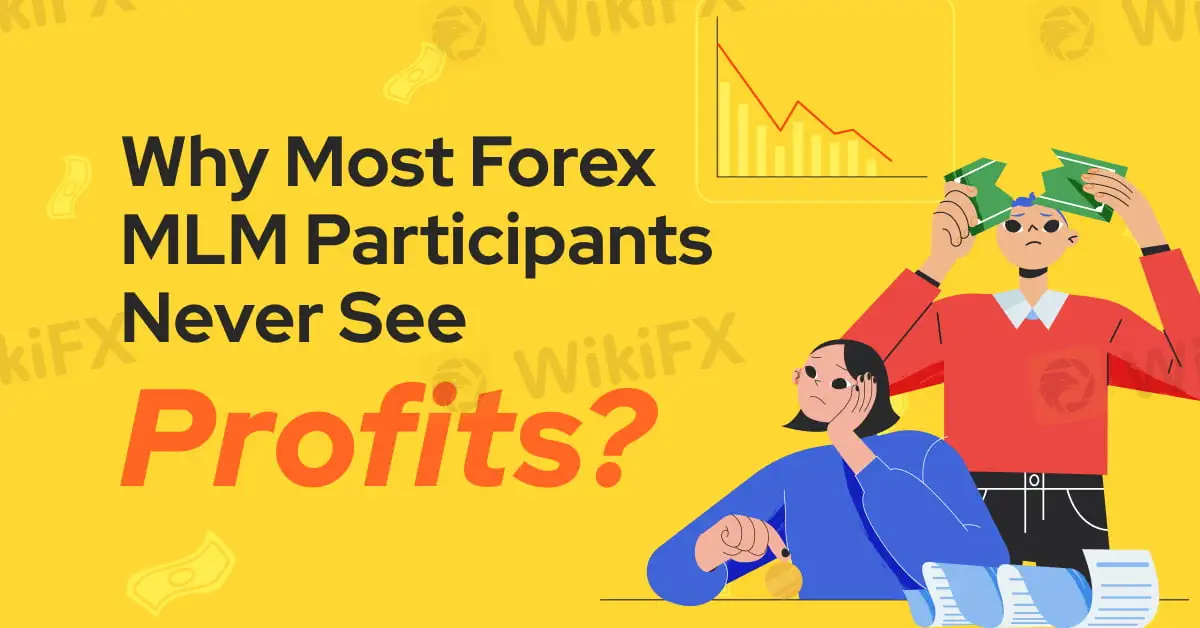简体中文
繁體中文
English
Pусский
日本語
ภาษาไทย
Tiếng Việt
Bahasa Indonesia
Español
हिन्दी
Filippiiniläinen
Français
Deutsch
Português
Türkçe
한국어
العربية
Why Most Forex MLM Participants Never See Profits?
Abstract:Forex-related MLMs have garnered significant attention, often for the wrong reasons. These Multi-Level Marketing (MLM) schemes typically promise participants substantial profits through foreign exchange (forex) trading, but the reality is often quite different. Here's a closer look at the phenomenon:

Forex-related MLMs have garnered significant attention, often for the wrong reasons. These Multi-Level Marketing (MLM) schemes typically promise participants substantial profits through foreign exchange (forex) trading, but the reality is often quite different. Here's a closer look at the phenomenon:

Forex-related MLMs operate on a classic pyramid scheme model, where participants earn commissions not only from their own trading but also from recruiting others into the program. In theory, this creates a lucrative income stream for those at the top. However, the vast majority of participants, especially those at the bottom of the pyramid, struggle to make any significant profits. This structure encourages aggressive recruitment over actual trading success.

One of the hallmarks of forex-related MLMs is their tendency to make exaggerated claims about the potential for profit. They often showcase testimonials from top earners, flaunt luxurious lifestyles, and use high-pressure sales tactics to convince newcomers that they can achieve similar success. In reality, most members do not see the promised returns and are left with little to show for their investments.

Forex-related MLMs often rebrand themselves regularly in response to increasing scrutiny from regulators and negative media coverage. The rebranding efforts often include tweaking their marketing strategies and product offerings to avoid legal repercussions. However, the core business model remains largely the same, with an emphasis on recruitment over actual forex trading education.

Forex-related MLMs have faced numerous investigations and legal challenges from regulatory bodies. The U.S. Commodity Futures Trading Commission (CFTC) and other international regulators have scrutinized these companies for misleading practices and the unrealistic promises made to participants. Despite these challenges, many such companies continue to operate, often shifting focus to regions with less stringent regulatory oversight.

For most participants, joining a forex-related MLM results in financial loss rather than gain. The complex compensation structures, high costs of entry, and the need to recruit constantly create an environment where only a small percentage of individuals, usually those at the very top, see any real profits. The majority, lured by the promise of easy money, often end up disillusioned and financially worse off than when they started.
Forex-related MLMs represent a troubling trend in the financial world. While they claim to offer education and opportunities in forex trading, their true focus lies in recruitment and the perpetuation of a pyramid-like structure. Potential participants should exercise caution, thoroughly research these schemes, and be aware of the high likelihood of financial loss.

Disclaimer:
The views in this article only represent the author's personal views, and do not constitute investment advice on this platform. This platform does not guarantee the accuracy, completeness and timeliness of the information in the article, and will not be liable for any loss caused by the use of or reliance on the information in the article.
Read more

ATFX Enhances Trading Platform with BlackArrow Integration
ATFX integrates the BlackArrow trading platform, offering advanced tools for forex, crypto, and stocks with automation and real-time analytics for traders.

Understanding Currency Intervention in Forex Markets
Currency intervention involves actions by a nation's central bank or monetary authority to influence the value of its currency in the foreign exchange (forex) market. These interventions aim to achieve specific economic objectives, such as controlling inflation, stabilizing the currency, or influencing trade balances.

IG 2025 Most Comprehensive Review
This article evaluates the broker from multiple dimensions, including a basic introduction, fees, safety, account opening, and trading platforms.

EXNESS 2025 Most Comprehensive Review
This article evaluates the broker from multiple dimensions, including a basic introduction, fees, safety, account opening, and trading platforms.
WikiFX Broker
Latest News
Germany's Election: Immigration, Economy & Political Tensions Take Centre Stage
WikiFX Review: Is IVY Markets Reliable?
ATFX Enhances Trading Platform with BlackArrow Integration
Brazilian Man Charged in $290 Million Crypto Ponzi Scheme Affecting 126,000 Investors
IG 2025 Most Comprehensive Review
Construction Datuk Director Loses RM26.6 Mil to UVKXE Crypto Scam
SEC Drops Coinbase Lawsuit, Signals Crypto Policy Shift
Should You Choose Rock-West or Avoid it?
Franklin Templeton Submitted S-1 Filing for Spot Solana ETF to the SEC on February 21
Scam Couple behind NECCORPO Arrested by Thai Authorities
Currency Calculator






